

Welcome : Pittsburgh Science of Learning Center. OpenLearningAnalytics.pdf. Policy_Strategy_Analytics.pdf. Journal of Learning Analytics. Current Issue Vol 2, No 1 (2015): Special section: Self-regulated learning and learning analytics Journal of Learning Analytics is a peer-reviewed, open-access journal, disseminating the highest quality research in the field.
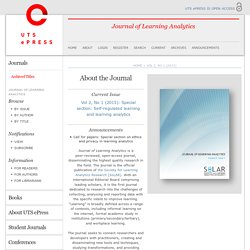
The journal is the official publication of the Society for Learning Analytics Research (SoLAR). With an international Editorial Board comprising leading scholars, it is the first journal dedicated to research into the challenges of collecting, analysing and reporting data with the specific intent to improve learning.
“Learning” is broadly defined across a range of contexts, including informal learning on the internet, formal academic study in institutions (primary/secondary/tertiary), and workplace learning. Sandbox:Phase Five Evaluation. Evaluation phase takes place once the course has successfully come to an end for the first time (sometimes this phase might happen while the course is running depending on the urgency of the issues and demands/feedback from students).
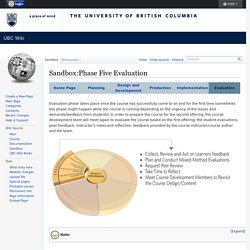
In order to prepare the course for the second offering, the course development team will meet again to evaluate the course based on the first offering, the student evaluations, peer feedback, instructor's notes and reflection, feedback provided by the course instructor/course author and the team. [Expand] Note: Tasks to be completed by the project manager/instructional designer: After the first offering of a course, the Project Manager/Instructional Designer may ask to meet with the course author/instructor to debrief how the course went.
Supporting Quality Assurance Documentation. How [unfavorable] student feedback improves Online Courses. I look forward to the end of each course session when I get to analyze student comments and criticisms – which I do with great zeal.
![How [unfavorable] student feedback improves Online Courses](http://cdn.pearltrees.com/s/pic/th/unfavorable-feedback-improves-113375445)
No doubt like anyone else, I enjoy reading the positive responses which can be uplifting and encouraging. But, it’s the constructive feedback I dissect to determine how we can improve our courses. I’ve learned that a key factor in gathering ‘good’ feedback is to develop a ‘good’ feedback form – one that is customized to the online experience. And, the questionnaire needs to be modified on a consistent basis as courses evolve and change – online courses are not static, nor should the questionnaire be. In this post I’ll share questions we’ve used to solicit ‘good’ feedback, and how it has helped improve our courses, and I’ll close with a list of resources for creating effective feedback forms in online learning environments. What is working well for you in the course? Questions about Course Design – using a 5 point Likert Scale.
SelfReviewGuide.pdf. 3 Ways of Getting Student Feedback to Improve Your Teaching. During the summer, you'll want to improve your teaching and lessons, but how do you decide where to start?
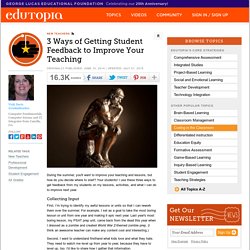
Your students! I use these three ways to get feedback from my students on my lessons, activities, and what I can do to improve next year. Collecting Input First, I’m trying to identify my awful lessons or units so that I can rework them over the summer. For example, I set as a goal to take the most boring lesson or unit from one year and making it epic next year. Second, I want to understand firsthand what kids love and what they hate. 1. I end the year with students in a circle. I'm so proud of what you've done this year and how you've improved. First of all, what did we learn that you loved this year? What were the things we learned that you liked the least? The Social Networks Adapting Pedagogical Practice (SNAPP) Tool and Visualizing Moodle Forums Welcome to Moodlenews.com A resource site for all Moodle-related news, tutorials, video, course content information and original resources.
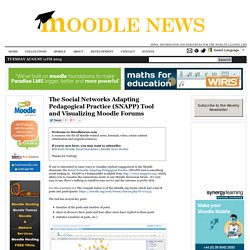
If you're new here, you may want to subscribe: RSS feed| Weekly Email Newsletter | Moodle News Twitter Thanks for visiting! If you’re interested in some ways to visualize student engagement in the Moodle classroom, the Social Networks Adapting Pedagogical Practice (SNAPP) tool is something worth looking at. SNAPP is a bookmarklet available from which allows you to visualize the connections made in any Moodle discussion forum. Strata 2012: Steve Schoettler, "Learning Analytics" EllisBroadeningBJET_submission.pdf. Learning Analytics. __userdata_documents7_am37_Documents_Downloads_LearningAnalytics-TiHE-full%5B1%5D.pdf. Four Lenses: Evaluation Resources - Teaching and Learning. The Faculty of Arts and Social Sciences encourages its teachers to engage in critical reflection on evidence about teaching and students' learning and to read the Faculty of Arts and Social Sciences Evaluation of Teaching Policy.
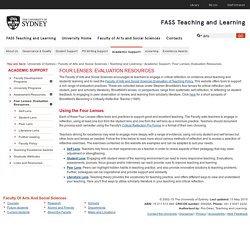
This website offers tools to support a rich range of evaluation practices. These are collected below under Stephen Brookfield's four lenses for critical reflection (self, student, peer and scholarly literature). Brookfield's lenses, or perspectives, range from systematic self-reflection, to reflecting on student feedback, to engaging in peer observation or review, and learning from scholarly literature. Click here for a short synopsis of Brookfield's Becoming a Critically Reflective Teacher (1995). Each of these Four Lenses offers tools and practices to support good and excellent teaching. Teachers striving for excellence may wish to engage more deeply with a range of evidence, using not only student and self lenses but other tools and lenses as needed.